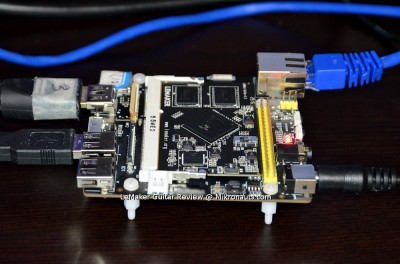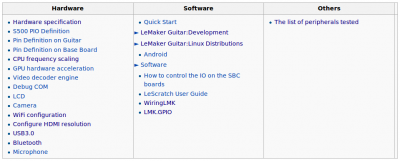LeMaker Guitar Review
hdparm
| hdparm | media | cached read | buffered read |
| Raspberry Pi B+ | ADATA | 159.6 | 19.5 |
| Raspberry Pi 2B | ADATA | 391.1 | 17.5 |
| MIPS CI20 | eMMC | ioctl err | ioctl err |
| MIPS CI20 | ADATA | 141.2 | 16.7 |
| Banana Pro | ADATA | 323.4 | 16.7 |
| ODROID-C1 | ADATA | 714.5 | 17.7 |
| ODROID-C1 | ADATA UHS | 690.2 | 29.3 |
| ODROID-C1 | Patriot | 690.1 | 14.3 |
| ODROID-C1 | Patriot UHS | 699.7 | 24.7 |
| ODROID-C1 | eMMC | 709.0 | 77.2 |
| ODROID XU4 | ADATA UHS | 798.3 | 33.1 |
| ODROID XU4 | eMMC | 986.7 | 110.9 |
| LeMaker Guitar 1 | eMMC | 315.7 | 47.5 |
| LeMaker Guitar 1 | ADATA UHS | ||
| LeMaker Guitar 2 | eMMC | 364.7 | 50.1 |
| LeMaker Guitar 2 | ADATA UHS |
Results are in megabytes per second.
The cached read hdparm test is basically a memory benchmark, and the high result returned by the ODROID-XU4 is a good indication of its high memory bandwidth.
The buffered read gives an indication of the high sequential read speed of eMMC.
The Guitar performs reasonably well – but at the risk of repeating myself, the XU4 dominates.
dd
| dd | media | dd read | dd copy | dd write |
| Raspberry Pi B+ | ADATA | 18.4 | 5.8 | 9.6 |
| Raspberry Pi 2B | ADATA | 18.5 | 6.8 | 10.9 |
| MIPS CI20 | eMMC | 7.9 | 6.7 | 32.9 |
| MIPS CI20 | ADATA | 18.5 | 3.7 | 4.8 |
| Banana Pro | ADATA | 17.5 | 8.1 | 16.4 |
| ODROID-C1 | ADATA | 16.5 | 7.3 | 8.1 |
| ODROID-C1 | ADATA UHS | 30.4 | 8.0 | 10.0 |
| ODROID-C1 | Patriot | 16.5 | 8.9 | 16.4 |
| ODROID-C1 | Patriot UHS | 27.8 | 12.2 | 23.1 |
| ODROID-C1 | eMMC | 80.8 | 11.6 | 14.5 |
| ODROID XU4 | ADATA UHS | 36.1 | 7.6 | 10.1 |
| ODROID XU4 | eMMC | 121.0 | 17.0 | 20.4 |
| LeMaker Guitar 1 | eMMC | n/a | n/a | n/a |
| LeMaker Guitar 1 | ADATA UHS | |||
| LeMaker Guitar 2 | eMMC | 54.9 | 20.7 | |
| LeMaker Guitar2 | ADATA UHS |
Results are in megabytes per second.
dd is a poor benchmark for server performance – but it can give a useful indication of maximum possible sequential read, write and copy speeds.
eMMC helps, but eMMC’s potential does not really reflect in the real world as you can see in the boot / launch time benchmarks.
There was no point in running other synthetic disk benchmarks on the eMMC on Guitar as the idea of a 4GB or 8GB server is frankly ludicrous.
Power Utilization
(click on image for larger version)
I will be adding power utilization figures when I update this review.
Documentation
The documentation for the LeMaker Guitar SOM and Base Board can be found on the LeMaker Wiki.
(click on image for larger version)
While terse, it is pretty good.
Support
Support has been quite good, especially given that the first Guitar I received was a pre-release board. I received several updated SD images that refused to boot on Guitar 1, and a couple of days before I received the second Guitar, even a new eMMC image with instructions how to flash it – however I decided to play with the new board revision before re-flashing Guitar 1.
Given that the Guitar was released, I did not want to wait any longer to publish this review.
In a couple of weeks I plan on updating this review with power consumption, USB 3.0 and proper 1080p results – perhaps on the other Ubuntu variant I spotted (and downloaded from) the LeMaker forums.
Conclusion
The LeMaker Guitar with Base Board for $45 is a great value for $45.
I liked the addition of an analog to digital input, hopefully WiringLMK and LMK.GPIO will support it soon (note to self: check on that) and the great set of features on the board.
It will be interesting to see what upcoming new base boards will be like, and to see improvements in driver support, and hopefully a good web browser.
Once the graphics resolution issue is fixed, I plan to take a look at Kodi – and perhaps someone will get Chromium running with pepperflash.
RoboPi worked on Guitar immediately, so I am considering building a RoboPi/Guitar based robot – having on-board IR receivers, microphone, WiFi and BT is very handy for robotics.
I will be keeping a careful eye on what LeMaker is doing with the Guitar, and I intend to update this review when circumstances warrant.
What I liked:
- $25 quad core SOM module with mounting holes
- $45 for SOM and BaseBoard
- Integrated WiFi and Bluetooth
- CPU performance at 1.1GHz with 1.3GHz supported
- WiringLMK and LMK.GPIO ports available at launch
What I did not like:
- 100Mbps Ethernet
- included web browser
- mini-USB3 connector instead of Type-A jack
- eMMC does not use full capacity
- scaled 1024×600 output instead of true 1080p
(I am sure this will be fixed soon)
Related Links
- ODROID XU4 Review
- ODROID C1 Review
- Mikronauts ODROID page
- Raspberry Pi 2 Model B Review
- Raspberry Pi Model A+ Review
- Raspberry Pi Model B+ Review
- Banana Pi Review
- Banana Pro Review
- MIPS Creator CI20 Review
- Ameridroid product page for the XU4 Shifter Shield (for ordering)
- ODROID-XU4 Wiki
- ODROID-XU4 Forums
- Raspberry Pi Model B+ USB WiFi Adapter Tests
- Banana Pi USB WiFi Adapter Tests
- Elf RoboPi/Raspberry Pi Robot
- RoboPi product page
- Pi Rtc Dio product page
- Pi Jumper product page
- EZasPi product page
Article Index
- Introduction
- A Closer Look at LeMaker Guitar & Base Board
- Feature Comparison
- Operating Systems, Software Compatibility
- Common Applications, WiFi, Bluetooth
- Hardware Compatibility
- More on Hardware Compatibility
- Benchmarks: Booting&Apps, Compiling Emacs, Sysbench
- Benchmarks: iperf client & server, NBench, UnixBench
- Benchmarks: hdparm, dd, Documentation, Support, Conclusion

